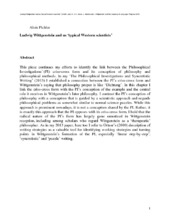Ludwig Wittgenstein and Us 'Typical Western Scientists'
Chapter, Peer reviewed
Accepted version
Permanent lenke
https://hdl.handle.net/1956/20647Utgivelsesdato
2015Metadata
Vis full innførselSamlinger
- Department of Philosophy [240]
Originalversjon
https://doi.org/10.1057/9781137472540_3Sammendrag
This piece continues my efforts to identify the link between the Philosophical Investigations’ (PI) criss-cross form and its conception of philosophy and philosophical methods. In my ‘The Philosophical Investigations and Syncretistic Writing’ (2013) I established a connection between the PI’s criss-cross form and Wittgenstein’s saying that philosophy proper is like ‘Dichtung’. In this chapter I link the criss-cross form with the PI’s conception of the example and the central role it receives in Wittgenstein’s later philosophy. I contrast the PI’s conception of philosophy with a conception that is guided by a scientistic approach and regards philosophical problems as somewhat similar to normal science puzzles. While this approach is prominent nowadays, it is not a conception shared by the PI. Rather, it is exactly this approach that the PI opposes with its criss-cross form. I hold that the radical nature of the PI’s form has largely gone unnoticed in Wittgenstein reception, including among scholars who regard Wittgenstein as a ‘therapeutic’ philosopher. As in my 2013 paper, here too I refer to Ortner’s (2000) description of writing strategies as a valuable tool for identifying working strategies and turning points in Wittgenstein’s formation of the PI, especially ‘linear step-by-step’, ‘syncretistic’ and ‘puzzle’ writing.
